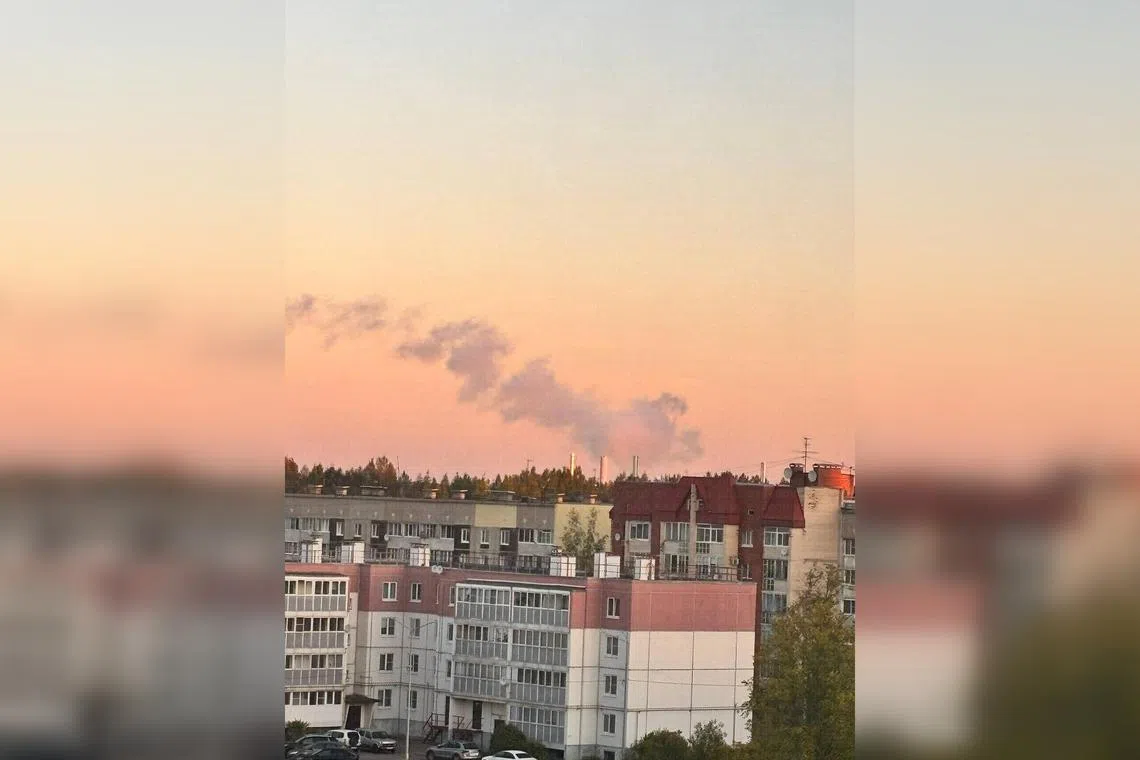Ukraine drones disrupt Russia’s key western oil terminal for the first time
Sign up now: Get ST's newsletters delivered to your inbox

A photo circulating on social media that is said to show Russia's Primorsk refinery ablaze. Primorsk is a key export hub for Russian oil.
PHOTO: X
- A Ukrainian drone attack forced a suspension of loadings at Russia's key oil terminal, Primorsk, for the first time on Sept 12.
- The attack, claimed by Ukraine’s SBU, set fire to two vessels; oil prices rose nearly 2 per cent afterwards, Reuters reports.
- Russian oil exports are already limited, with Ust-Luga port operating at half capacity after an August drone attack.
AI generated
MOSCOW - A Ukrainian drone attack on Russia’s north-western port of Primorsk has for the first time forced the suspension of loadings at its key western oil terminal, according to two industry sources and Ukraine’s military.
Primorsk has a capacity to load about one million barrels per day (bpd) of crude, making it a key export hub for Russian oil and the largest port in western Russia. The port loads a flagship Russian Urals oil grade as well as about 300,000 bpd of diesel.
The drone strike, the first reported such attack on the port, set fire to two vessels, the industry sources said.
Kyiv has intensified its drone attacks on Russian energy infrastructure as it pushes for talks to end the war in Ukraine, trying to cut Russia off from its main source of revenue – crude oil sales – by limiting export capabilities.
Ukraine's SBU security agency said it had hit the Primorsk port with drones overnight, leading to a fire and the suspension of loading operations.
Oil loadings from Primorsk were suspended early on Sept 12, two industry sources familiar with oil loadings from the port said. It was not clear if the operations had resumed at the time of writing.
The Russian governor of the region around the port, Mr Alexander Drozdenko, confirmed that a drone attack had set fire to one vessel and a pumping station but did not report any suspension of operations.
Mr Drozdenko later said the fire had been extinguished and that there was no risk of an oil spill. More than 30 drones were destroyed over the region, he said.
The Transneft pipeline operator operating the port and Russia's Energy Ministry declined to comment.
Oil prices rose by nearly 2 per cent after the attack on Primorsk suspended loadings, outweighing pressure from oversupply concerns and weaker US demand risks.
Tankers hit
Two oil tankers, Kusto and Cai Yun, were hit by the attack, according to the industry sources.
Kusto is an Aframax tanker, with capacity to carry about 700,000 barrels, and is owned and managed by Solstice, according to LSEG. Cai Yun is an Aframax owned and managed by Acceronix. Both are registered in the Seychelles, public databases show.
Other Russian ports, including nearby Ust-Luga and the Black Sea’s Novorossiisk, have been repeatedly targeted by Ukraine in recent months.
Russian oil exports are already limited as Ust-Luga port has yet to restore its capacity in full after a drone attack in August. The port is loading at half capacity this month.
Russia has revised its September crude export plan from western ports to 2.1 million barrels per day (bpd), an 11 per cent increase from the initial schedule, as drone strikes on domestic refineries have reduced local demand for crude.
Primorsk is near St Petersburg, where Pulkovo Airport briefly suspended operations. Russia’s military reported intercepting 221 Ukrainian drones overnight. Ukraine’s General Staff had no immediate comment on the Russian report.
Mr Vladimir Putin attended an opening ceremony for the port of Primorsk in 2001, a year after becoming Russia’s president, as the country was reducing its dependence on other Baltic ports. REUTERS


